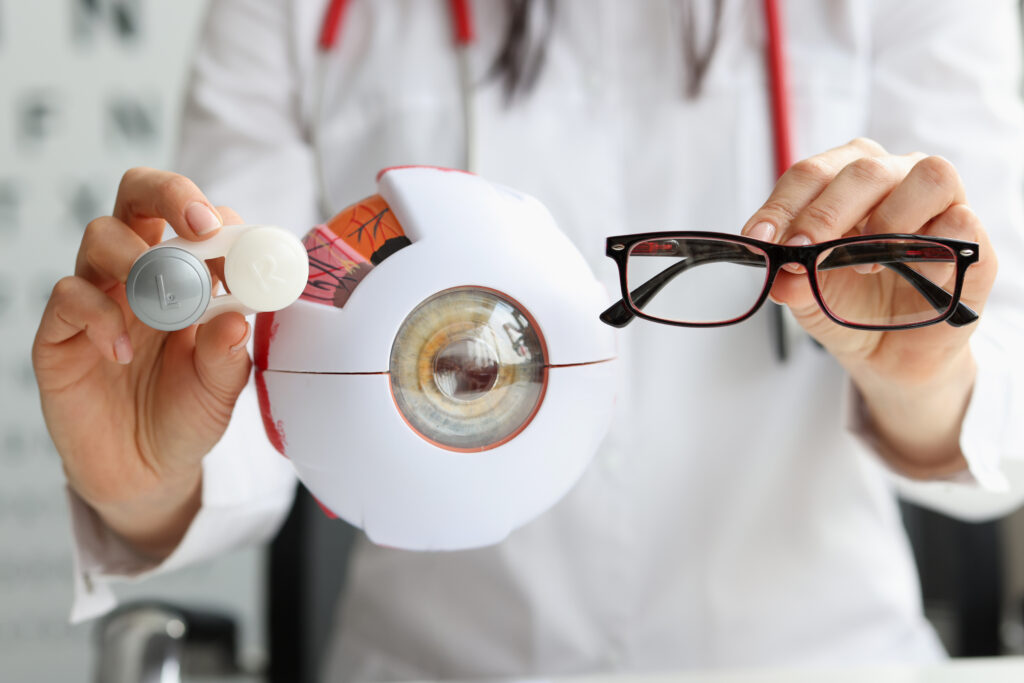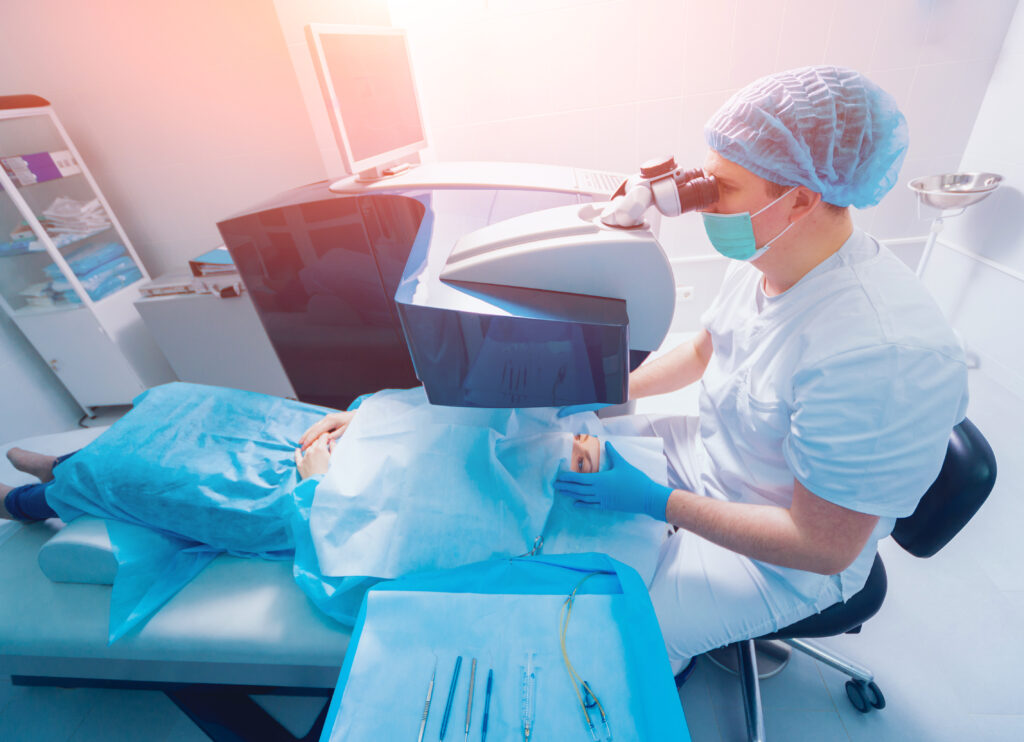Retina Services
- Home
- Retina Services
Netrodaya The Eye City Varanasi
If you experience any symptoms of retinal problems or need expert care for an existing condition, don’t hesitate to contact us. At Netrodaya, we are here to help you achieve and maintain optimal eye health. Choose Netrodaya Hospital for the best retina treatment at the Best Retina Hospital in Varanasi. Dr. Abhishek Chandra is the best eye doctor for retina treatment in Varanasi and North India.
Introduction to Retina Health
The retina is a crucial component of your eye, responsible for converting light into neural signals that the brain interprets as vision. Maintaining retinal health is essential for preserving good vision and overall eye health. At Netrodaya, North India’s largest eye hospital, we specialize in diagnosing and treating various retinal conditions using advanced technology and expert medical care. If you are looking for Retina surgery in Varanasi, Netrodaya is the best choice for advanced treatments and expert care.
Common Retina Problems
1. Diabetic Retinopathy
Overview: Diabetic retinopathy is a complication of diabetes that affects the blood vessels in the retina. High blood sugar levels can damage these blood vessels, leading to vision loss if left untreated.
Symptoms:
• Blurred vision
• Dark or empty areas in your vision
• Vision loss
• Difficulty seeing colors
Treatment: Treatment options include controlling blood sugar levels, laser treatment, injections, and vitrectomy surgery. Our expert Retina surgeon in Varanasi ensures the best treatment outcomes.
2. Age-Related Macular Degeneration (AMD)
Overview: AMD is a condition that affects the macula, the central part of the retina, leading to loss of central vision. It is a common cause of vision loss in older adults.
Symptoms:
• Blurred or reduced central vision
• Difficulty reading or recognizing faces
• A dark or empty area in the center of vision
Treatment: While there is no cure for AMD, treatments such as anti-VEGF injections, laser therapy, and nutritional supplements can help manage the condition.


3. Retinal Detachment
Overview: Retinal detachment occurs when the retina separates from the back of the eye, leading to potential permanent vision loss if not treated promptly.
Symptoms:
• Sudden appearance of floaters
• Flashes of light
• Shadow or curtain over part of your visual field
Treatment: Surgical options include laser photocoagulation, cryopexy, pneumatic retinopexy, scleral buckle, and vitrectomy.
4. Retinal Vein Occlusion
Overview: This condition occurs when a vein in the retina becomes blocked, often leading to sudden vision loss.
Symptoms:
• Sudden vision loss
• Blurry or distorted vision
Treatment: Treatment options include laser therapy, anti-VEGF injections, and corticosteroids to reduce swelling.
Retina Surgery at Netrodaya
At Netrodaya, we offer advanced retina surgery in Varanasi for various retinal conditions. Our experienced retina surgeon in Varanasi uses cutting-edge technology and techniques to provide the best possible outcomes for our patients.
Vitrectomy
- What is Vitrectomy? Vitrectomy is a surgical procedure that involves removing the vitreous gel from the eye to access the retina and perform necessary repairs.
Procedure:
• Anesthesia: The procedure is performed under local or general anesthesia.
• Incisions: Small incisions are made in the sclera (white part of the eye).
• Vitreous Removal: The vitreous gel is carefully removed.
• Retinal Repair: The surgeon performs the necessary repairs, such as sealing retinal tears or removing scar tissue.
• Replacement: The vitreous is replaced with a saline solution, gas bubble, or silicone oil.
Recovery:
• Patients may need to maintain a specific head position if a gas bubble is used.
• Follow-up visits are crucial to monitor healing and ensure the success of the surgery.
• Vision improvement may take several weeks to months.
Laser Photocoagulation
What is Laser Photocoagulation? Laser photocoagulation is a minimally invasive procedure that uses laser energy to treat retinal tears, diabetic retinopathy, and other retinal conditions.
Procedure:
• Anesthesia: The procedure is typically performed under local anesthesia.
• Laser Application: The laser is directed to the affected areas of the retina to create small burns, which seal retinal tears or reduce abnormal blood vessels.
Recovery:
• Patients can usually return home the same day.
• Mild discomfort and blurry vision may occur temporarily.
Scleral Buckle Surgery
What is Scleral Buckle Surgery? Scleral buckle surgery is a procedure to repair retinal detachment by indenting the sclera to bring the retina back into contact with the eye wall.
Procedure:
• Anesthesia: The procedure is performed under local or general anesthesia.
• Buckle Placement: A silicone band (buckle) is placed around the sclera to push it inward.
• Retinal Repair: Any retinal tears are sealed using cryopexy or laser photocoagulation.
Recovery:
• Hospital stay may be required for a day or two.
• Vision recovery may take several weeks.
Diagnosis and Evaluation
At Netrodaya, we use advanced diagnostic tools to evaluate retinal conditions accurately. Our comprehensive diagnostic process includes:
Optical Coherence Tomography (OCT)
OCT provides detailed cross-sectional images of the retina, allowing for the early detection and monitoring of retinal diseases such as AMD, diabetic retinopathy, and macular holes.
Fundus Photography
Fundus photography captures detailed images of the retina, helping in the diagnosis and documentation of various retinal conditions.
Fluorescein Angiography
This procedure involves injecting a fluorescent dye into the bloodstream and taking photographs of the retina to highlight blood vessels and identify abnormalities.
Preventive Measures
Maintaining good eye health can help prevent many retinal conditions. Here are some tips to keep your retina healthy:
• Regular Eye Exams: Schedule regular eye check-ups, especially if you have risk factors such as diabetes or a family history of retinal diseases.
• Manage Chronic Conditions: Keep conditions like diabetes and hypertension under control.
• Healthy Lifestyle: Maintain a balanced diet rich in antioxidants, exercise regularly, and avoid smoking.
• Protect Your Eyes: Wear sunglasses to protect your eyes from harmful UV rays and use protective eyewear during activities that could cause eye injuries.
Patient-Centered Care
At Netrodaya, patient care is our priority. We understand the concerns associated with retinal conditions and surgeries. Our team of compassionate healthcare professionals is dedicated to providing personalized care and support throughout your treatment journey. Visit Netrodaya, the Best Eye Hospital in Varanasi, for expert Retina surgery in Varanasi by the best Retina surgeon in Varanasi.
Frequently Asked Questions
Retina surgery is a specialized procedure performed to treat conditions like retinal detachment, diabetic retinopathy, macular holes, and retinal vein occlusion. If left untreated, these conditions can lead to vision loss.
Dr. Abhishek Chandra, a renowned retina surgeon in Varanasi, leads the retina department at Netrodaya. He has extensive experience in performing advanced retinal procedures with high success rates.
Symptoms of retinal disorders include:
- Blurred or distorted vision
- Flashes of light or sudden appearance of floaters
- Dark spots or shadows in the visual field
- Blurred or distorted vision
Loss of central or peripheral vision
At Netrodaya – The Best Retina Surgery Hospital in Varanasi, we offer:
- Vitrectomy (removal of vitreous gel to repair the retina)
- Laser Photocoagulation (sealing retinal tears using a laser)
- Scleral Buckling Surgery (placing a silicone band to reattach the retina)
- Vitrectomy (removal of vitreous gel to repair the retina)
Intravitreal Injections for macular degeneration and diabetic retinopathy
Recovery time depends on the type of procedure performed. Patients may need a few weeks to months for full vision stabilization. Post-operative care, including medications, follow-ups, and maintaining specific head positions, is crucial for healing.
Retina surgeries at Netrodaya are performed under local or general anesthesia, ensuring a pain-free experience. Patients may experience mild discomfort post-surgery, which is managed with prescribed medications.
You can schedule an appointment at Netrodaya – The Best Retina Surgery Hospital in Varanasi by:
- Visiting our website
- Calling our helpline
- Walking into our hospital for a direct consultation
- Visiting our website
